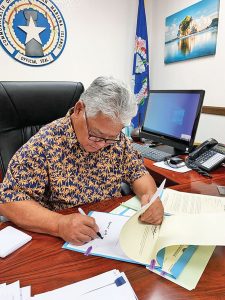Palacios submits $115.4M proposed budget for FY24
Palacios submits $115.4M proposed budget for FY24
Gov. Arnold I. Palacios submitted to the Legislature yesterday a proposed $115.4- million budget for the government for fiscal year 2024, which is $786,532 less than the $116.1 million revised budget for fiscal year 2023 that he just signed last week.
In his proposed budget, Palacios said the anticipated gross budgetary resources available for fiscal year 2024 is $172.56 million. After adjustments—deducting debt service obligations, earmarked funds and other obligations such as the annual payments due the Settlement Fund—a total of $115.41 million is available for appropriation.
To supplement the net resources, Palacios said his administration proposes a new revenue stream to address persistent challenges and sustain government operations and services.
He said they will need the enactment of legislation to generate additional revenues from the Gross Revenue Tax.
Palacios said the proposed budget calls for the reinstatement of earmarked funds that were suspended in fiscal year 2023 as they prioritize services and programs to grow the CNMI economy, protect the environment, and the welfare of the workforce.
The earmarked funds are the Solid Waste Management Revolving Fund, Solid Waste Revolving Fund (7% excise tax), Group Health and Life Insurance for Employer Share, and Marianas Visitors Authority Hotel Occupancy Tax (80%).
Palacios said the resumption of Asiana Airlines’ four weekly flights beginning April 27, 2023, and transitioning to daily flights in July 2023 is a promising sign for the continued recovery of tourism in the Marianas with the Korean market.
“This added seating capacity to the Marianas will progressively help us reach pre-pandemic arrivals,” he said.
With Japan easing entry and departure requirements, Palacios said they are hopeful that the Marianas will be considered a choice destination, with United Airlines currently operating direct flights to and from Japan.
He said the request to reinstate the earmark of the Hotel Occupancy Tax reserve funding to MVA supports the effort to promote and market the Commonwealth in source countries in the region through MVA.
For fiscal year 2024, the administration proposes to maintain the suspension of 12 statutory earmarks to support the activities identified in the proposed budget. These 12 statutory earmarks are the Nonresident Worker Fee Fund for the Northern Marianas College and Public School System; Tobacco Control-Cigarette Tax; PSS Technical Education; Cancer Fund-Cigarette Tax; NMI Retirement Fund-Hotel Tax (20%); NMIRF-Alcohol Container (30%); MVA-Alcohol Container (20%); NMIRF Defined Benefit Plan Fund-50% gaming; NMIRF-60% E-gaming; 3rd Senatorial District-15% E-gaming; 1st and 2nd Senatorial District-10% gaming; and 3rd and 2nd Senatorial District-Public Law 20-59.
Palacios said his administration is also proposing rate changes to the current schedule of the Business Gross Revenue Tax. He said the proposal is to increase BGRT by .5% for gross revenue earnings in excess of $50,000, an increase of 1% for gross revenue earnings in excess of $250,000 to $750,000, and an increase to 6% for gross revenue earnings in excess of $750,000.
Palacios urged the Legislature to act swiftly on this proposed amendment to the BGR schedule as this budget anticipates to realize revenues beginning on the first day of the second quarter of fiscal year 2024.
The governor said that, having closely scrutinized the funding requests of the departments and agencies (which exceeded the anticipated resources by $86.5 million), the budget worksheets reflect a balanced budget and takes into account only critical activities and the mandatory set-asides for debt service payments and the annual payment to the Settlement Fund.
In addition, he said, the budget submission incorporates constitutional mandates and expenditure restrictions: 26% to PSS; 72 hours biweekly work schedule for the Executive Branch; allocation of $577,000 for participating members of the Defined Contribution Plan; allocation of $7.2 million toward Medicaid payments; partial allocation of $1.8 million to pay for central government utilities with the exception of the Judiciary and Legislature; and reduced allocation to the Office of the Mayor of Tinian to $111,231.
Palacios said personnel is the largest cost category in the CNMI’s budget, comprising 60% of the CNMI’s expenditures. The personnel expense category includes salaries, fringe benefits (Defined Benefit and Defined Contribution Plans, group health and life benefits, and FICA and Medicare).
Palacios said the budget includes salaries within the Executive Branch based on a 72-hour bi-weekly work schedule continuing from fiscal year 2023 into fiscal year 2024.
The exceptions to this shortened work schedule are police, firefighters, Department of Corrections officers, and other law enforcement personnel within the central government. Palacios said these employees are 100% funded.
The salaries and benefits contingency imbedded in this budget is derived from the calculations applied across all positions within the Executive Branch regardless of participation in the group life insurance program, he said.
He said mandatory benefits for FICA and Medicare are included in this proposal.
For pensions (Settlement Fund-Defined Benefit), Palacios said the Commonwealth’s minimum annual payment for fiscal year 2024 is $34 million. This funding, he said, is adjusted from the anticipated gross budgetary resources to defray the cost of the 75% pension outlay due the Settlement Fund for payment to the retirees.
He said the annual pension payment continues to drop each year with the accelerating mortality rate.
The governor disclosed that the 25% pension payments needed for the retirees is estimated at $13 million. “Although this program benefit presents a significant funding challenge, the Commonwealth’s goal is to continue to protect the retirees’ income and pay these promised benefits,” he said.
He said the amount of $577,000 is allocated to fund the employer share of the Defined Contribution Plan for participating members.
Palacios asked for consideration to enact legislation amending the salary compensation law to authorize the annual salary compensation of key Cabinet positions within the range of $65,175 and not to exceed $100,000.
He said this group of workers were excluded for consideration for a salary adjustment in Public Laws 19-83 or 21-9, and an amendment to update the salary ceiling to be consistent with these statutes will allow a fair and equitable pay adjustment for them.
Palacios said allocation to PSS was calculated at 25% of the net identified budgetary resources available for general appropriation or $28.8 million.
He said funding allocation to support the central government workforce is allocated to sustain a work schedule of 72 hours across all three islands and also affecting municipal governments, with the exception of law enforcement personnel and police and firefighters as such positions are fully funded at 100%.
He said the Judicial and Legislative branches were kept at the current operating level as fiscal year 2023 allocation, which provides 100% funding for personnel based on a full work schedule.
Palacios said allocation to fund the mandatory match toward the Medicaid Reimbursement program is reduced from $9 million to $7.2 million for fiscal year 2024.
He said since matching is only required when an expense is incurred, other sources of funding will need to be identified prior to this funding being exhausted to ensure the program benefits will continue.
On government utilities, Palacios said the government’s resources are insufficient to fully fund this expense, but $1.8 million is being provided in this budget as an assurance of the government’s commitment to pay for its utilities consumption.
Palacios noted that utilities are also part of the federal programs allocation that will pay toward their program’s utilization of the facilities they occupy.
Furthermore, he said, government agencies have opted to utilize the prepaid meters where energy consumption is effectively controlled and a reduction in the usage and cost of utilities is anticipated.
Allocation to the Office of the Mayor of Tinian and Aguiguan is reduced by $2.7 million, which will fund only one position for the mayor of Tinian at $111,000.
He said the funding to support the Office of the Mayor of Tinian is part of the special revenue fund allocation worksheet amounting $2.7 million for 124 positions within the Office of the Mayor.
The source of funding, he said, is derived from the $3 million the municipality received via a wire transfer by the CNMI Treasury to the Municipal Treasury’s account in December 2022.
Palacios said the funds were identified as American Rescue Plan Act funds that the municipality has not spent as confirmed by the mayor during a budget meeting with the mayor and Office of Management and Budget last April 15.



























